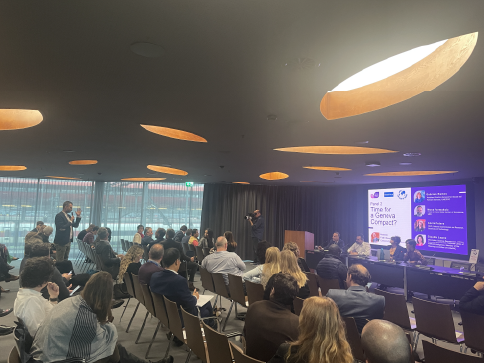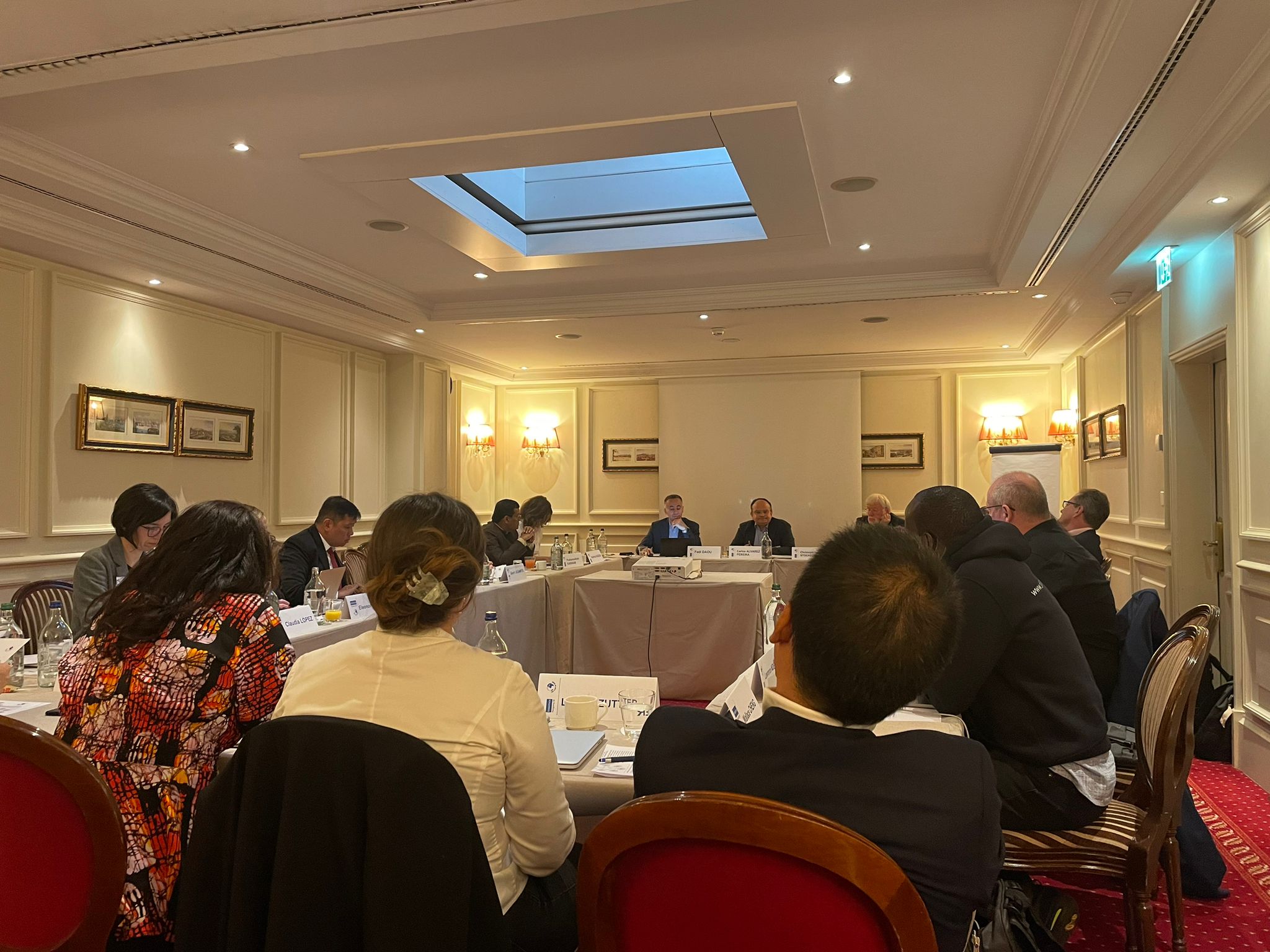Ethical Reframing of AI: Time for a Geneva Compact?
All news
Read all about ethics and our resources, events and projects worldwide
 "When directed towards the public good, Artificial Intelligence’s unprecedented capabilities can foster productive dialogue and empower individuals. However, if left unchecked AI also poses a massive threat to democratic societies." - Gabriela Ramos, Assistant Director-General for Social and Human Sciences at UNESCO
"When directed towards the public good, Artificial Intelligence’s unprecedented capabilities can foster productive dialogue and empower individuals. However, if left unchecked AI also poses a massive threat to democratic societies." - Gabriela Ramos, Assistant Director-General for Social and Human Sciences at UNESCO
"Lack of capacity in smaller countries and developing countries is a barrier to global cooperation on AI ethics and operationalizing AI principles. It is important that a global compact can facilitate coordination and communication on various initiatives, as well as mobilize funding." - Claudia Lopez, Assistant Professor, Informatics Department, Universidad Técnica Federico Santa María; Fellow at Chile National Center for AI
On 2 November 2023, as part of the prestigious Geneva Peace Week, Globethics hosted a policy briefing panel discussion around AI ethics in collaboration with the Club of Rome. Over 800 people from over 40 countries registered for this session.
The panel convened experts from various sectors (technologists, academia, the public sector, the private sector, and civil society) as well as diverse regions, perspectives, and generations. The multi-lens view was of critical importance to establishing an ongoing platform for reshaping the future of AI, as highlighted by Gabriela Ramos, Assistant Director-General for Social and Human Sciences at UNESCO, in her panel address:
"We need to include voices from across society and from around the world. Our approach to ethical artificial intelligence governance must be multilateral, multistakeholder, and truly inclusive to ensure that good practices and effective governance, frameworks, and legislations are shared, are led together, and are adopted internationally, and that the benefits of this technology are equitably distributed."
 During the first round of panel discussions, Larissa Zutter (United States, Research Fellow and Member of the Board of Directors, Center for AI and Digital Policy); Laurence Nderu (Kenya, Researcher, Lecturer, and Chairman of the Department of Computing at Jomo Kenyatta University of Agriculture and Technology (JKUAT)); Iason Gabriel (UK, Staff Research Scientist, Google Deepmind); Arief Hamdani Gunawan (Indonesia, Senior Advisor, Telkom; Advisory Board Member in IEEE (Institute of Electrical and Electronics Engineers)), and Karima Kadaoui (Morrocco, Executive President, Tamkeen Community Foundation for Human Development) grappled with the main issues of the ethical reframing of AI: How can we put AI at the service of communities and humanity, amidst on the ground and existential challenges? What do responsibility and trust mean in this context?
During the first round of panel discussions, Larissa Zutter (United States, Research Fellow and Member of the Board of Directors, Center for AI and Digital Policy); Laurence Nderu (Kenya, Researcher, Lecturer, and Chairman of the Department of Computing at Jomo Kenyatta University of Agriculture and Technology (JKUAT)); Iason Gabriel (UK, Staff Research Scientist, Google Deepmind); Arief Hamdani Gunawan (Indonesia, Senior Advisor, Telkom; Advisory Board Member in IEEE (Institute of Electrical and Electronics Engineers)), and Karima Kadaoui (Morrocco, Executive President, Tamkeen Community Foundation for Human Development) grappled with the main issues of the ethical reframing of AI: How can we put AI at the service of communities and humanity, amidst on the ground and existential challenges? What do responsibility and trust mean in this context?
Four key aspects supporting trust and humanity in AI were put forward by the panellists: transparency, accountability, algorithmic bias, and privacy. The need to discuss responsibility and trust-building on a societal level, to keep citizens informed about the implications of the technology they are using and being impacted by, and for an entity accountable for AI were highlighted. Further, experts discussed how AI systems that are truly inclusive can be created and how AI can be enabled as an instrument that manifests our humanity.
The second round of the panel explored the need for a Geneva Compact amidst the rapidly changing AI technologies. Gabriela Ramos (UNESCO); Musa Parmaksiz (Switzerland, Head of AI and Data Center of Excellence, UBS); Anicia Peters (Namibia, Chief Executive Officer, National Commission on Research, Science and Technology), and Claudia Lopez (Chile, Assistant Professor, Informatics Department, Universidad Técnica Federico Santa María; Research Fellow of Chile National Center of AI) shared their views.
The panellists addressed the realities of inequality and discrimination in current AI systems and the lessons that need to be learnt from the impact of AI-embedded social media on human lives, particularly amongst the youth. The need for a compact was established as an open, ongoing, multi-stakeholder platform to interrogate the questions around AI ethics, to facilitate the coordination and communication of efforts to use human values in AI, and to mobilise funding for these initiatives.
 Preceding the panel session, on 1 November, Globethics and the Club of Rome also convened a closed-door round table with 23 experts including those who spoke on the Geneva Peace Week panel. The deep dive was focused on recent advancements in AI ethics policies and practical research and explored the feasibility of an ongoing multi-stakeholder compact centred on AI ethics.
Preceding the panel session, on 1 November, Globethics and the Club of Rome also convened a closed-door round table with 23 experts including those who spoke on the Geneva Peace Week panel. The deep dive was focused on recent advancements in AI ethics policies and practical research and explored the feasibility of an ongoing multi-stakeholder compact centred on AI ethics.
Both the public panel and the round table were moderated by Globethics Executive Director Fadi Daou and Club of Rome Vice President Carlos Álvarez Pereira. This marked an important and fruitful starting point for a multi-stakeholder Geneva Compact to reflect on ethical frameworks for AI. The outputs of the discussions will contribute to various policy processes including UNESCO’s second Ethics of AI Summit in February 2024, the WSIS 20+ Forum High Level Event in May 2024, and the United Nations Summit for the Future in September 2024.
Globethics is grateful for the contributions of industry experts and thought leaders on this critical topic and looks forward to further developing this initiative alongside partner individuals and institutions, as part of our work on the ethics of digital and emerging technologies for a more just, inclusive and sustainable world.
Get in touch with our Policy Development and Creation team to learn more and get involved.

